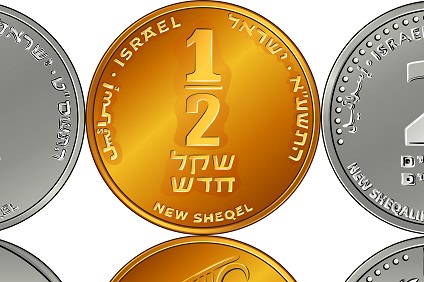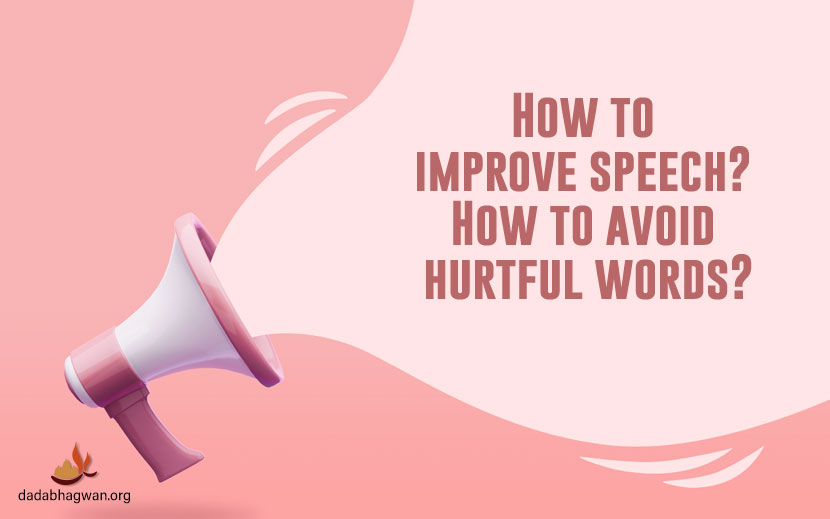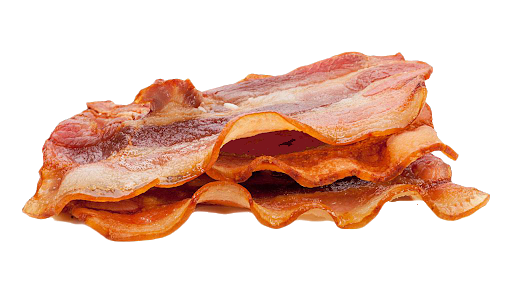We’re at the bottom of דף נ״ז עמוּד ב, and as background it is helpful to know something about מַחַצִית הַשֶׁקֶל. A very good resource I’d recommend you check is available through this entry at OU Torah.org.

The Daf begins:
שׁוֹמֵר חִנָּם אֵינוֹ נִשְׁבָּע וְכוּ׳: וּרְמִינְהוּ, בְּנֵי הָעִיר שֶׁשָּׁלְחוּ אֶת שִׁקְלֵיהֶן וְנִגְנְבוּ אוֹ שֶׁאָבְדוּ:
After determining the source of the halachos in the Mishnah, the Gemara analyzes them. The Mishnah teaches: A שׁוֹמֵר חִנָּם does not take a שְׁבוּעָה if these items were stolen or lost, but the Gemara raises an apparent contradiction from a mishna elsewhere (Shekalim, 5a). That mishna points out that מַחַצִית הַשֶׁקֶל was donated by the populace during the month of Adar, and placed in a special chamber in the בֵּית הַמִקְדָשׁ, As needed, some of the shekels were taken for use in purchasing public offerings in the coming months. This was done in order to give all of the Jewish people a share in those public offerings. Additionally, from the moment that the money is taken from there, both those shekels that arrived at the בֵּית הַמִקְדָשׁ and those that did not yet arrive become property of the בֵּית הַמִקְדָשׁ. The mishna (Shekalim 5a) notes that if the שְׁקָלִים that the residents of the city sent to the בֵּית הַמִקְדָשׁ were stolen from the transporting agent or were lost en route, the halacha depends on the circumstances.
אִם מִשֶּׁנִּתְרְמָה הַתְּרוּמָה –
If this occurred after the contributions of the chamber had already been collected from the chamber,
נִשְׁבָּעִין לַגִּזְבָּרִין, וְאִם לָאו – נִשְׁבָּעִין לִבְנֵי הָעִיר, וּבְנֵי הָעִיר שׁוֹקְלִין אֲחֵרִים תַּחְתֵּיהֶן. נִמְצְאוּ, אוֹ שֶׁהֶחְזִירוּם הַגַּנָּבִים – אֵלּוּ וְאֵלּוּ שְׁקָלִים הֵם, וְאֵין עוֹלִין לָהֶם לַשָּׁנָה הַבָּאָה
– the agents must take a שְׁבוּעָה to the treasurers [גִּזְבָּרִין] that they did not misappropriate the coins. If the collection of the chamber was not yet performed, the lost or stolen שְׁקָלִים remain the property of the residents of the city. Therefore, the agents take a שְׁבוּעָה to the residents of the city. The residents of the city then contribute other שְׁקָלִים in place of the original ones. If the original שְׁקָלִים were then found or the thieves returned them, both the original שְׁקָלִים and the replacement ones assume the status of הֶקְדֵשׁ, and belong to the בֵּית הַמִקְדָשׁ. But the two מַחַצִית הַשֶׁקֶל that they each contributed this year do not count to absolve them from their obligation to contribute מַחַצִית הַשֶׁקֶל for the following year. Hence this mishna is teaching that a שׁוֹמֵר חִנָּם does take a שְׁבוּעָה concerning הֶקְדֵשׁ, which is in apparent contradiction to our Mishnah.
אָמַר שְׁמוּאֵל: הָכָא בְּנוֹשֵׂא שָׂכָר עָסְקִינַן, וְנִשְׁבָּעִין לִיטּוֹל שְׂכָרָן. אִי הָכִי, נִשְׁבָּעִין לַגִּזְבָּרִין? לִבְנֵי הָעִיר מִבְּעֵי לֵיהּ! אָמַר רַבָּה: נִשְׁבָּעִין לִבְנֵי הָעִיר בְּמַעֲמַד גִּזְבָּרִין, כִּי הֵיכִי דְּלָא נִחְשְׁדִינְהוּ, וְאִי נָמֵי, כִּי הֵיכִי דְּלָא לִקְרוֹ לְהוּ ״פּוֹשְׁעִים״
שְׁמוּאֵל said: Here we are dealing with the category of שׁוֹמֵר שָׂכָר, and the purpose of the שְׁבוּעָה is not to exempt them from their liability to pay for the theft. Rather, they take a שְׁבוּעָה that they performed their safeguarding properly, in order to collect their wages. The Gemara asks: If so, is the phrase “נִשְׁבָּעִין לַגִּזְבָּרִין” accurate? The tanna should have taught “נִשְׁבָּעִין לִבְנֵי הָעִיר”, because it is the residents of the cit from whom they are claiming their wages. רַבָּה said the agents take a שְׁבוּעָה to the residents of the city in the presence of the גִּזְבָּרִין, so that the treasurers will not suspect that the residents of the city did not contribute their שְׁקָלִים at all. Alternatively, the agents take a שְׁבוּעָה that they executed their mission properly, so that the גִּזְבָּרִין will not call them negligent.

וְהָא נִגְנְבוּ אוֹ שֶׁאָבְדוּ קָתָנֵי, וְשׁוֹמֵר שָׂכָר בִּגְנֵיבָה וַאֲבֵידָה חַיּוֹבֵי מִיחַיַּיב! וְהָכָא נָמֵי, נְהִי דְּשַׁלּוֹמֵי לָא מְשַׁלְּמִי, אַגְרַיְיהוּ מִיהָא לַפְסֵיד
But, the Gemara asks, why would the שׁוֹמְרִים be paid their wages if they didn’t do their job? After all, an essential part of their function was to prevent theft or loss of the שְׁקָלִים!
אָמַר רַבָּה: נִגְנְבוּ – בְּלִסְטִים מְזוּיָּין, אָבְדוּ – שֶׁטָּבְעָה סְפִינָתוֹ בַּיָּם
רַבָּה explains that when the tanna says that the שְׁקָלִים were stolen, it is referring to a case where armed bandits were involved. And when the tanna said that the שְׁקָלִים were lost, the reference is to a case where the agent’s ship sank at sea. Since the שְׁקָלִים left his possession through circumstances beyond his control, this is considered an unavoidable accident [אוֹנֶס], for which a שׁוֹמֵר שָׂכָר is exempt.
Cutting to the chase:
אֶלָּא אָמַר רַבִּי אֶלְעָזָר: שְׁבוּעָה זוֹ תַּקָּנַת חֲכָמִים הִיא, שֶׁלֹּא יְהוּ בְּנֵי אָדָם מְזַלְזְלִים בַּהֶקְדֵּשׁוֹת
Rather, רַבִּי אֶלְעָזָר said: The שְׁבוּעָה of the agents is a תַּקָּנַת חֲכָמִים, instituted so that people will accord property of הֶקְדֵשׁ proper respect. If they knew that a שְׁבוּעָה would not be involved, they would neglect to safeguard the שְׁקָלִים properly. (A heavy indictment of human nature here.)
Let’s zoom ahead further to this:

רַבִּי יְהוּדָה אוֹמֵר: אַף הַמּוֹכֵר סֵפֶר תּוֹרָה, מַרְגָּלִית וּבְהֵמָה, אֵין לָהֶם אוֹנָאָה. תַּנְיָא, רַבִּי יְהוּדָה אוֹמֵר: אַף הַמּוֹכֵר סֵפֶר תּוֹרָה, אֵין לָהּ אוֹנָאָה – לְפִי שֶׁאֵין קֵץ לְדָמֶיהָ. בְּהֵמָה וּמַרְגָּלִית, אֵין לָהֶם אוֹנָאָה – מִפְּנֵי שֶׁאָדָם רוֹצֶה לְזַוְּוגָן
רַבִּי יְהוּדָה says that in the case of selling a סֵפֶר תּוֹרָה, a pearl, or an animal, those items are not subject to the halachos of אוֹנָאָה. In the case of the סֵפֶר תּוֹרָה which is considered priceless, אוֹנָאָה doesn’t apply because one cannot attach a value to the sale. An animal and a pearl are not subject to אוֹנָאָה because a person seeks to pair them. Meaning, an animal is paired with an animal of similar strength so that they can be yoked together to work in the field. A pearl is paired with a similar pearl to fashion them into jewelry. Given that the value of the first is greatly increased by adding the second of the pair, circumstances dictate that the value of the second is greater to the purchaser than it normally would be. This is a classic example of the answer to a question being “it depends”.
אָמְרוּ לוֹ: וַהֲלֹא הַכֹּל אָדָם רוֹצֶה לְזַוְּוגָן? וְרַבִּי יְהוּדָה, הָנֵי חֲשִׁיבִי לֵיהּ, וְהָנֵי לָא חֲשִׁיבִי לֵיהּ. וְעַד כַּמָּה? אָמַר אַמֵּימָר: עַד כְּדֵי דְּמֵיהֶם
Hold on, the חַכָמִים said. Isn’t it the case that with regarding any item that when a person seeks to pair them with similar items that אוֹנָאָה doesn’t apply? Why single out pearls and animals? רַבִּי יְהוּדָה responded that we’re talking about a case where it’s particularly important for the buyer to find a precise match for an animal or for a pearl. And up to how much can one deviate from the value of items for which אוֹנָאָה does not apply? אַמֵּימָר said: One can deviate up to double their value. So if my understanding is correct, whereas אוֹנָאָה is normally capped at an increase of one-sixth the value of the item, when the item has particular significance or importance to the buyer (sentimental value, functionality, etc.), the cap on אוֹנָאָה can go as high as double the normal value.
תַּנְיָא, רַבִּי יְהוּדָה בֶּן בְּתֵירָא אוֹמֵר: אַף הַמּוֹכֵר סוּס וְסַיִיף וַחֲטִיטוֹם בַּמִּלְחָמָה – אֵין לָהֶם אוֹנָאָה, מִפְּנֵי שֶׁיֵּשׁ בָּהֶן חַיֵּי נֶפֶשׁ
It is taught in a baraisa that רַבִּי יְהוּדָה בֶּן בְּתֵירָא says: Even in the case one who sells a horse, or a sword, or a shield during wartime, these items are not subject to אוֹנָאָה because they have the capacity to preserve life, and a person is willing to pay any price for them.
At this juncture, Rabbi Stern noted that his muse, Rav Sruly Bornstein at the 37:00 mark of his Day Yomi from today, cites the Aruch Hashulchan, Chosehn Mishpat, סִימָן רכ״ז. Basically he’s saying that once upon a time when the Yid lived in the shtetl, there was a very standard price for an item. [To this I’ll add it’s like the sanctioned price fixing you see between gas stations these days in a particular neighborhood — price per gallon rarely deviates by a few cents, yet alone the one-sixth upper limit of אוֹנָאָה]. But for most items, in this day and age, there is no longer a fixed price for most items. There are many different business models which include variables such as overhead, the luxury and convenience of the shopping experience, online shopping (Amazon) and so forth. One might therefore wonder if the laws of אוֹנָאָה being set at one-sixth still apply in today’s marketplace.
On to our next Mishnah, which broaches the sensitive topic of אוֹנָאָה to one’s choice of words.

כְּשֵׁם שֶׁאוֹנָאָה בְּמִקָּח וּמִמְכָּר, כָּךְ אוֹנָאָה בִּדְבָרִים. לֹא יֹאמַר לוֹ: בְּכַמָּה חֵפֶץ זֶה? וְהוּא אֵינוֹ רוֹצֶה לִיקַּח. אִם הָיָה בַּעַל תְּשׁוּבָה, לֹא יֹאמַר לוֹ: זְכוֹר מַעֲשֶׂיךָ הָרִאשׁוֹנִים. אִם הוּא בֶּן גֵּרִים, לֹא יֹאמַר לוֹ: זְכוֹר מַעֲשֵׂה אֲבוֹתֶיךָ, שֶׁנֶּאֱמַר: ״וְגֵר לֹא תוֹנֶה וְלֹא תִלְחָצֶנּוּ״
Just as there is a prohibition against אוֹנָאָה in buying and selling [אוֹנָאַת מָמוֹן], so is there אוֹנָאָה in words that tare tantamount to verbal mistreatment through our statements [אוֹנָאַת דְּבָרִים]. The Mishna cites three example of אוֹנָאַת דְּבָרִים:
- One may not ask a seller how much he wants for a particular item if he has no intent of purchasing that item from him.
- If one is a בַּעַל תְּשׁוּבָה, another may not say to him: “Remember your earlier deeds.”
- If one is the child of גֵּרִים, another may not say to him: “Remember the deeds of your ancestors”, as it is stated: “You should not mistreat a convert, nor should you oppress him” (וְגֵ֥ר לֹא־תוֹנֶ֖ה וְלֹ֣א תִלְחָצֶ֑נּוּ כִּֽי־גֵרִ֥ים הֱיִיתֶ֖ם בְּאֶ֥רֶץ מִצְרָֽיִם – Shemos 22:20).
The Gemara elaborates on the Mishnah:
תָּנוּ רַבָּנַן: ״לֹא תוֹנוּ אִישׁ אֶת עֲמִיתוֹ״ – בְּאוֹנָאַת דְּבָרִים הַכָּתוּב מְדַבֵּר. אַתָּה אוֹמֵר בְּאוֹנָאַת דְּבָרִים, אוֹ אֵינוֹ אֶלָּא בְּאוֹנָאַת מָמוֹן? כְּשֶׁהוּא אוֹמֵר ״וְכִי תִמְכְּרוּ מִמְכָּר לַעֲמִיתֶךָ אוֹ קָנֹה מִיַּד עֲמִיתֶךָ״, הֲרֵי אוֹנָאַת מָמוֹן אָמוּר! הָא מָה אֲנִי מְקַיֵּים ״לֹא תוֹנוּ אִישׁ אֶת עֲמִיתוֹ״? בְּאוֹנָאַת דְּבָרִים
It is written: “And you shall not mistreat [tonu] one man his colleague; and you shall fear your God, for I am the Lord your God” (וְלֹ֤א תוֹנוּ֙ אִ֣ישׁ אֶת־עֲמִית֔וֹ וְיָרֵ֖אתָ מֵֽאֱלֹהֶ֑יךָ כִּ֛י אֲנִ֥י יְהֹוָ֖ה אֱלֹהֵיכֶֽם – Vayikra 25:17). The tanna explains: The פָּסוּק is speaking with regard to אוֹנָאַת דְּבָרִים. The baraisa questions this, and suggests that perhaps it’s speaking only with regard to אוֹנָאַת מָמוֹן. When it says in a previous פָּסוּק: “And if you sell to your colleague an item that is sold, or acquire from your colleague’s hand, you shall not exploit his brother” (וְכִֽי־תִמְכְּר֤וּ מִמְכָּר֙ לַעֲמִיתֶ֔ךָ א֥וֹ קָנֹ֖ה מִיַּ֣ד עֲמִיתֶ֑ךָ אַל־תּוֹנ֖וּ אִ֥ישׁ אֶת־אָחִֽיו – Vayikra 25:14), אוֹנָאַת מָמוֹן is explicitly stated. How then do we interpret the meaning of the פָּסוּק of וְלֹ֤א תוֹנוּ֙ אִ֣ישׁ אֶת־עֲמִית֔וֹ? It must be referring to אוֹנָאַת דְּבָרִים.
הָא כֵּיצַד? אִם הָיָה בַּעַל תְּשׁוּבָה, אֵל יֹאמַר לוֹ: ״זְכוֹר מַעֲשֶׂיךָ הָרִאשׁוֹנִים״. אִם הָיָה בֶּן גֵּרִים, אַל יֹאמַר לוֹ: ״זְכוֹר מַעֲשֵׂה אֲבוֹתֶיךָ״. אִם הָיָה גֵּר וּבָא לִלְמוֹד תּוֹרָה, אַל יֹאמַר לוֹ: ״פֶּה שֶׁאָכַל נְבֵילוֹת וּטְרֵיפוֹת, שְׁקָצִים וּרְמָשִׂים, בָּא לִלְמוֹד תּוֹרָה שֶׁנֶּאֶמְרָה מִפִּי הַגְּבוּרָה״
How so? If one is a בַּעַל תְּשׁוּבָה, another may not say to him: Remember your earlier (inappropirate) deeds. If one is the child of גֵּרִים, another may not say to him: Remember the deeds of your ancestors. If one is a גֵּר and he came to study Torah, one may not say to him: Does the mouth that ate unslaughtered carcasses and animals that had wounds that would have caused them to die within twelve months, and repugnant creatures, and creeping animals [נְבֵילוֹת וּטְרֵיפוֹת, שְׁקָצִים וּרְמָשִׂים], come to study Torah that was stated from the mouth of הקבּ״ה?
Rabbi Stern posed the following question: Of all the aveiros that the גֵּר could have previously engaged in, why does the baraisa focus on מַאַכָלוֹת אִיסוּרוֹת? After all, when he was a goy, it was permissible for him to eat in McDonald’s.

The answer is that eating נְבֵילוֹת וּטְרֵיפוֹת, שְׁקָצִים וּרְמָשִׂים is metamtem halev (impurifies the heart). Rabbi Stern noted that we previously cited a ruling from Rav Moshe Feinstein allowing an individual with severe mental challenges to be placed in an institution, even though they would be feeding him מַאַכָלוֹת אִיסוּרוֹת there. Rav Moshe contrasted this with a teshuva from the Chasam Sofer who said that he would not allow a person with rehabilitatable mental challenges who has a chance of attaining functionality to be institutionalized because eating מַאַכָלוֹת אִיסוּרוֹת there is going to be metamtem halev to the point where it would stick with them the rest of their lives and be an impediment that is difficult if not impossible to overcome.
Apropos to this, Rabbi Stern cited a Meshech Chochma from פַּרְשַׁת וָאֶתְחַנָן which states:
ובתים מלאים כ”ט. אפילו קדלי דחזירי הותר בז’ שכבשו כו’. לכן מסיק השמר לך, כי טבע דברים האסורים שמטמטם את הלב וכמו שכתוב, ונטמתם בם וכו’ ואפילו אם אוכלן בהיתר. ודו”ק. ולכן יחלל שבת לחולה ולא יאכילנו נבלה. ודו”ק
Let’s look again at the source פְּסוּקִים there:
וְהָיָ֞ה כִּ֥י יְבִיאֲךָ֣ ׀ יְהֹוָ֣ה אֱלֹהֶ֗יךָ אֶל־הָאָ֜רֶץ אֲשֶׁ֨ר נִשְׁבַּ֧ע לַאֲבֹתֶ֛יךָ לְאַבְרָהָ֛ם לְיִצְחָ֥ק וּֽלְיַעֲקֹ֖ב לָ֣תֶת לָ֑ךְ עָרִ֛ים גְּדֹלֹ֥ת וְטֹבֹ֖ת אֲשֶׁ֥ר לֹא־בָנִֽיתָ׃
וּבָ֨תִּ֜ים מְלֵאִ֣ים כל־טוּב֮ אֲשֶׁ֣ר לֹא־מִלֵּ֒אתָ֒ וּבֹרֹ֤ת חֲצוּבִים֙ אֲשֶׁ֣ר לֹא־חָצַ֔בְתָּ כְּרָמִ֥ים וְזֵיתִ֖ים אֲשֶׁ֣ר לֹא־נָטָ֑עְתָּ וְאָכַלְתָּ֖ וְשָׂבָֽעְתָּ׃
הִשָּׁ֣מֶר לְךָ֔ פֶּן־תִּשְׁכַּ֖ח אֶת־יְהֹוָ֑ה אֲשֶׁ֧ר הוֹצִֽיאֲךָ֛ מֵאֶ֥רֶץ מִצְרַ֖יִם מִבֵּ֥ית עֲבָדִֽים׃
This challenge is discussed in the Gemara Chulin on דף י״ז עמוּד א:
אימת אילימא בשבע שכבשו השתא דבר טמא אישתרי להו דכתיב (דברים ו, יא) ובתים מלאים כל טוב ואמר ר’ ירמיה בר אבא אמר רב כתלי דחזירי
With regard to what period does Rabbi Yirmeya raise his dilemma? If we say that the dilemma is with regard to the seven years during which they conquered the land, non-kosher items were permitted for them during that period, as it is written in פַּרְשַׁת וָאֶתְחַנָן that “וּבָ֨תִּ֜ים מְלֵאִ֣ים כל־טוּב֮ אֲשֶׁ֣ר לֹא־מִלֵּ֒אתָ֒ וּבֹרֹ֤ת חֲצוּבִים֙ אֲשֶׁ֣ר לֹא־חָצַ֔בְתָּ כְּרָמִ֥ים וְזֵיתִ֖ים אֲשֶׁ֣ר לֹא־נָטָ֑עְתָּ וְאָכַלְתָּ֖ וְשָׂבָֽעְתָּ” – and ר’ ירמיה בר אבא quotes רב as saying that the cuts of pig meat [כתלי דחזירי] that they found in the houses were permitted for them. As Rashi explains there, כתלי דחזירי refers to bacon: חזירים יבשים שקורין בקונ”ש

But, the Meschech Chochma cautions, even though eating bacon was technically permitted to eat during that transition period, we should avoid eating it at all costs in accordance with the pasuk that follows which emphasizes הִשָּׁ֣מֶר לְךָ֔. Why the caution? Because כי טבע דברים האסורים שמטמטם את הלב. This caution about not corrupting the heart [מְטַמְטֵם אֶת הַלֵב] is so strong, Rabbi Stern emphasizes, that the Meschech Chochma adds: “ולכן יחלל שבת לחולה ולא יאכילנו נבלה” – that given the choice of eating bacon versus shechting a kosher animal in violation of Shabbos, it would be better to violate the Shabbos.
Wow! רַב מֵאִיר שִׂמְחָה has given us much food for thought.
